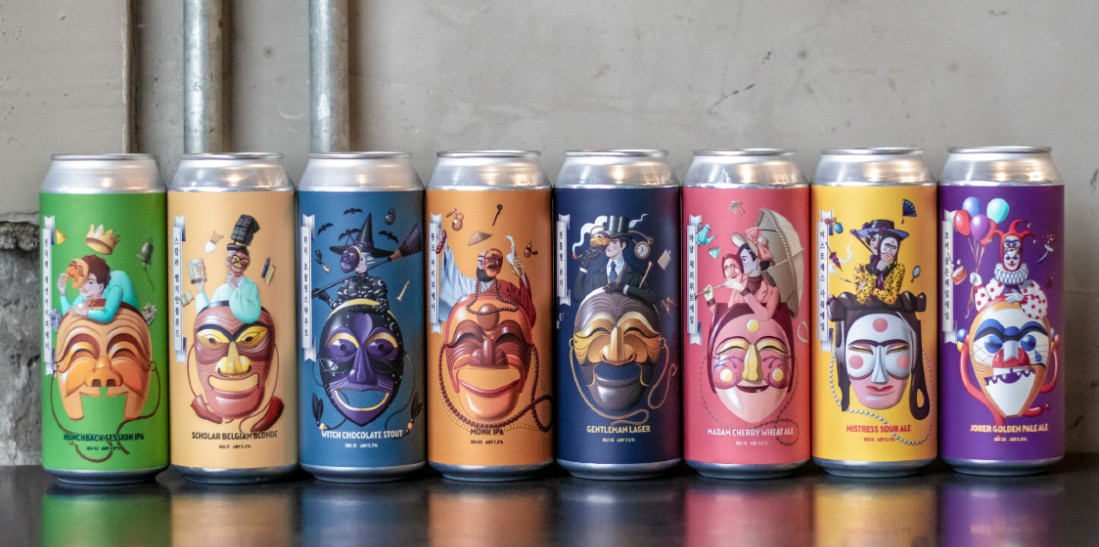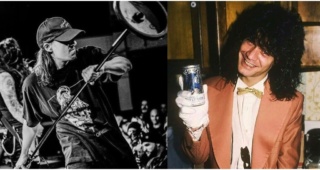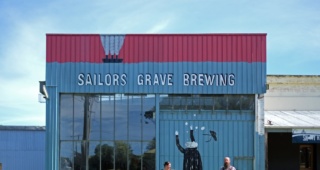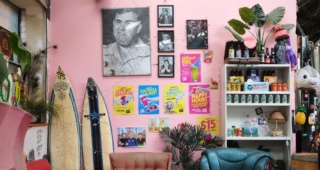Hype is a funny, fickle thing in craft beer.
Marketing instigates some of it, sure, but marketing only goes so far as you move towards the pointy end of craft, where the more hardcore beer enthusiasts dwell and sip and snark. The rating blessings of Untappd and fawning buzz on other social platforms drive as much hype as anything these days. And as others note, after awhile hype simply feeds itself.
When you’re in Asia, however, and most beers or breweries riding first class in the Hype Train come from the other side of the planet, geographic context is everything. If there were a scientific equation for craft beer hype in Asia, elements would include some combination of distance between beer producer and beer consumer, beer style, number of Instagram photos, and Untappd ratings and check-ins.
In that regard, many Western craft breweries enjoy rock-star status the minute they touch down in Asia, deservedly or not. There are reasons for it, of course—like, you know, legitimately awesome beers and breweries—but it’s fair to say ingrained perception, or bias, among some pointy-end drinkers at times unfairly renders the playing field more uneven than it should be between Western and Asian craft breweries. Hype is by default a far tougher slog for Asian breweries to achieve both at home and abroad, which isn’t to say hype is something for which any brewery should (or should not) strive. You know what I’m saying. Hopefully.
Consider, for example, a recent string of brewery debuts in Singapore. As I previously noted, almost all of an air-freighted pallet of Grimm Artisanal Ales (Brooklyn, NY) sold out by preorder. Those pale and hoppy beers were really good, in part because they were really fresh, but also because Grimm might be the best brewery in the NYC metropolitan area. I’m sure the sours were hot, too.
A few weeks later Temple Cellars, the same distributor who sourced Grimm, brought air-freighted pallets from two more New York breweries, Equilibrium Brewery (about 75 miles north of NYC) and Interboro Spirits & Ales (Brooklyn). There were no preorders this time, but there was plenty of hype; maybe moreso than for Grimm.
With the exception of a few lower-strength pale ales, everything in those respective pallets was gone online within an hour or less, premium pricing of $16 – $23 (or so) per can and all. I didn’t try everything that came in, or speak to everyone who did, but based on what I tasted and what I heard from a few trusted sources those beers were… fine. Fresh, fun to try, and fine. I’m sure others felt they were the best thing they’ve tasted this side of Russian River, and that’s great—subjectivity and debate help make beer such a wonderful thing. I do wonder how many people who shelled out $18 for an Interboro IPA had heard of Interboro before Temple Cellars successfully (and admirably) hyped the brewery.
In contrast, South Korean craft beer just landed for the first time ever in Singapore. (Exciting!) Imported and distributed by Juju Brews, this debut shipment features a notably diverse range of styles from seven well-regarded craft breweries based around the country. (Neat!) I’m not sure about actual sales, but the public reaction amongst pointy-end drinkers could thus far be largely described as a shrug. (What the fuck?)
In 2017, Time Out Seoul called Playground Brewery “what everybody in the Korean craft beer industry is talking about.” Packaged in 500ml cans sporting distinctive artwork inspired by Hahoe byeolsingut talnor—a masked, traditional Korean dance-drama—Playground’s haul in Singapore includes The Monk IPA (3.72 Untappd), Hopsplash NEIPA (3.76), and chocolate stout The Witch (3.56). The latter two beers won gold and silver medals at the 2018 Asia Beer Championship, and The Witch took bronze a year later.
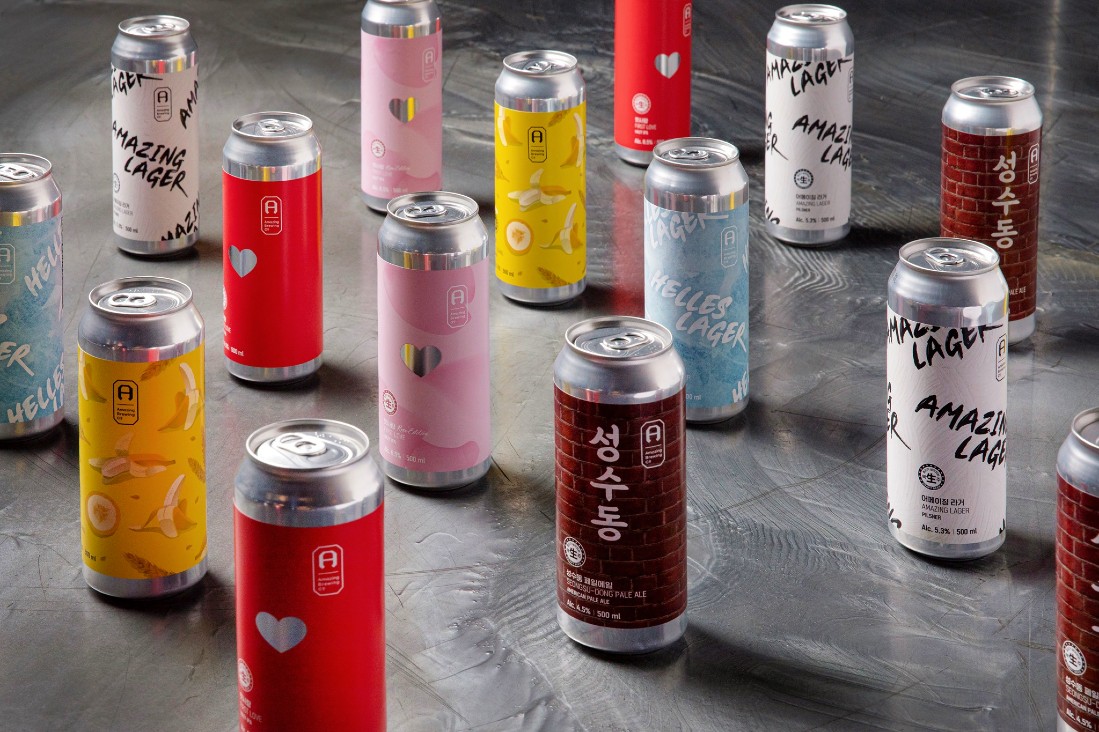
Amazing Brewing Co’s seven-beer lineup is headlined by its hazy First Love IPA (3.77), limited-edition First Love IPA with rose (4.25), and 8% raspberry milk stout Dark Ambition (3.52). Busan’s Gorilla Brewing Co bagged several awards at the 2018 and 2019 ABCs. Hand & Malt runs Korea’s largest hop farm. Budnamu Brewery, which in a past life brewed makgeolli (Korean rice wine), plays with unique Korean ingredients like green plums, sweet flag, and sancho peppers.
Maybe I’m missing something, but this is big news. Where’s the hype?
To be fair, chalk up some of this to distributor reputation. Temple Cellars is an established, respected craft beer retailer with a strong mailing list and social media reach. Juju Brews is completely new in town, and at the time of this story’s publication had about 3,000 fewer Instagram followers and 3,600 fewer of the same on Facebook. And to their credit, like any successful retailer Temple Cellars does a great job hyping its special releases.
Related: I Love You, Busan—Two Nights of Craft Beer Bars and Breweries
I wasn’t blown away by the beers that found their way to Singapore, but I’m not trying to take anything away from Equilibrium or Interboro. They both enjoy generally high Untappd ratings for their pale, hoppy, and/or hazy IPAs—and these beer styles are king around here. They do also benefit from their New York and American cache; again, geographic context is key for hyped craft beer in Asia, and North America is where it’s at as far as craft goes.
In comparison, consider that there was literally no South Korean craft beer as recently as 10 years ago, and that craft brewing has only taken off in the past few years. But man, it’s really taking off.
Today there are well over 100 craft breweries in the country. South Korean breweries bagged 15 awards at the 2018 ABC, then topped that tally in 2019 with 33 awards (including 22 medals), sweeping the IPA, Stout, and Dark/Brown Ale categories. Magpie Brewery won the whole shebang, scoring “Champion Beer of Asia” for its The Ghost gose. It’s worth noting that Eastern Craft Trading will soon bring Magpie to Singapore, too.
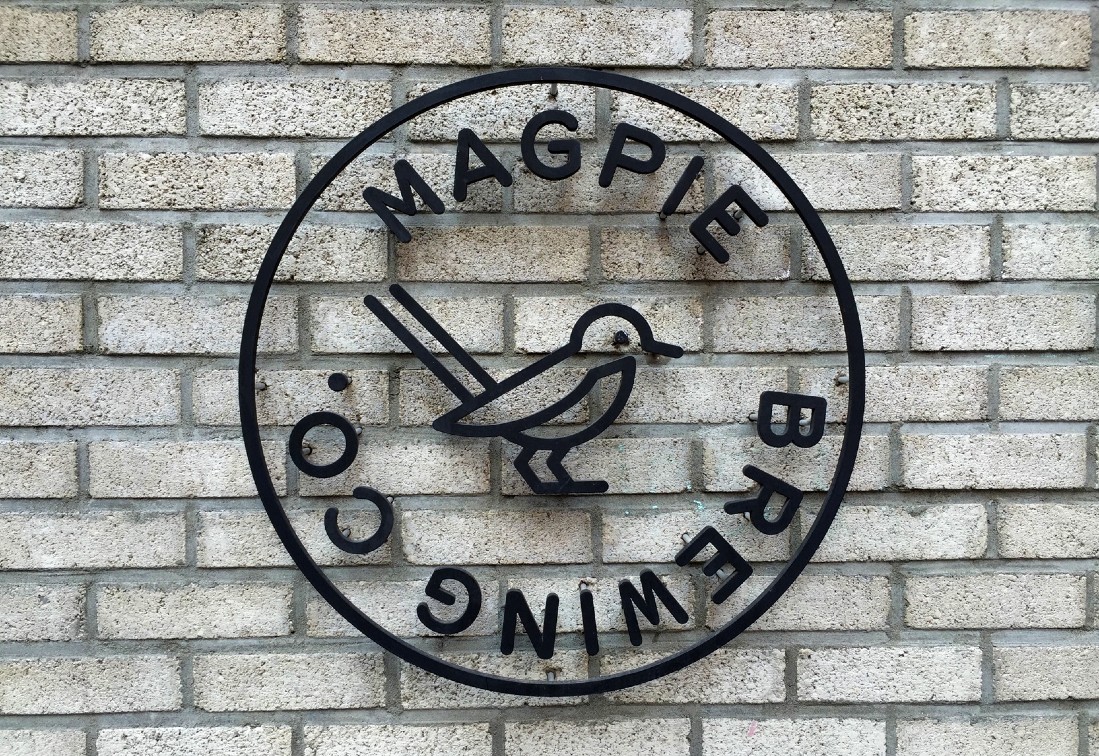
Clearly, South Korean craft beer is on the rise and its arrival in Singapore deserves more hype—and I think it’ll come. I’ve thus far only had a few beers from Juju Brews, but Playground’s The Monk is an exceptional West Coast-style IPA with a creamy, pillowy mouthfeel and perfect burst of tropical hops; at 7.2% it’s far too smashable. Playground’s Hopsplash and Amazing’s First Love are both fantastic New England IPAs; that both were canned about 1.5 months before I cracked them and still tasted reasonably fresh and punchy speaks volumes to the care with which they were brewed and handled. I’m psyched to try more.
For now the hype equation will always tilt in a Western direction, but I for one am hyped about recent arrivals—and what’s still to come—from craft breweries in up-and-coming markets like South Korea and others that are a little closer to home.
###
For more on Juju Brews and South Korean craft beer, we speak with Juju Brews founder Yu Yan, a twentysomething Singaporean who manages the operation with his girlfriend Erin, who is based in Seoul.
Beer Travelist: How long have you been working on Juju Brews?
Yu Yan: The idea really only came together during this pandemic. I was working in the corporate world doing sales, then left that job and decided I didn’t really care for that world anymore. I also realized how much beer I was ordering online, and knew other people were doing it, too. Places like Temple Cellars, Thirsty, Beer Force… I knew their sales went up exponentially. I think moving into beer delivery makes sense; people seem to be more comfortable with it now, and it feels like a good time to introduce new brands to Singapore.
BT: Where’s the love for South Korean craft beer outside of South Korea?
Yu Yan: Craft brewing there is still pretty nascent, and most of the breweries have really only been trying to grow internally. I went to Korea several years ago and there was nothing. I went back two years ago, and there were some, and each time I’ve gone back I’ve seen it significantly grow in terms of the accessibility, quantity, and quality.
It’s interesting that Korean craft isn’t more popular elsewhere, especially in a place like Singapore where we love Korean stuff, which is everywhere. Random Korean snacks that I can’t find in Korea I can find here. You can buy Hite and Cass at the grocery store, and those beers suck, so there’s a weird disconnect there. I thought this was a good opportunity to start expanding that.
BT: Why these seven breweries?
Yu Yan: To be honest they moved the fastest. We were talking to maybe 20 breweries, and the interesting thing for a lot of them was that because they’re mostly brewing for South Korea they don’t have bottling and canning lines, and mostly just do kegging. For example, Galmegi Brewing Co said they wouldn’t be canning again until September, which is crazy. They built a business just on kegs, which I think compared to many other countries it’s often the opposite.
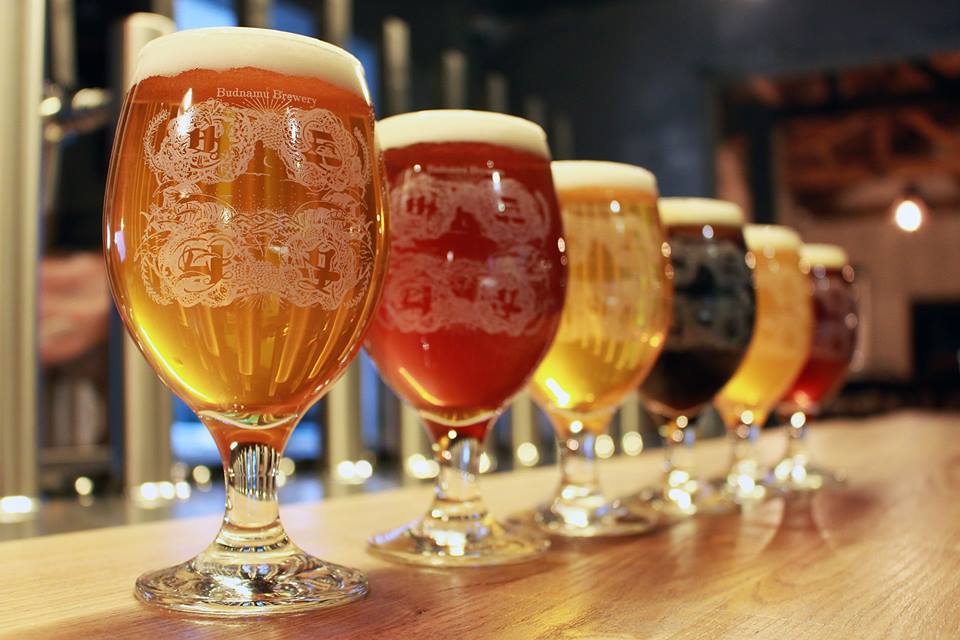
Budnamu Brewery is pretty interesting and probably the most traditional brewery we’ve brought in. They mainly focus on the local market, and this is their first time exporting. I like their stuff because it’s very different. They used to make rice wine, and now use a lot of rice in their beer. I wouldn’t compare them to Hitachino Nest, but there’s a similar history.
I remember having their IPA for the first time and thinking that this was someone that had an idea of an IPA, but didn’t know how to brew it in a traditional sense, so they tried to recreate it, like a chef. I got that feeling from all the rest of the beers, too—they had an idea, then saw what they could do in a local context.
BT: How did you put together the first shipment as far as beer styles?
Yu Yan: I brought basically everything the breweries offered in cans and then some bottles, too. The list wasn’t super crazy for most of them; just core lineups and a few seasonals. I know the trend in Singapore is hazy New England-style IPAs—that’s what everyone drinks—so I made sure to bring those.
BT: Have you by chance spoken with Wild Wave?
Yu Yan: We’ve been texting; I really like their stuff. I’m surprised that a concept like that, with all the wild ales, has done so well in South Korea. Hopefully we’ll bring them in soon.
BT: Does Untappd help or hurt Juju Brews?
Yu Yan: Untappd is a good thing, but it’s a problem when you’re outsourcing reviews and people are using those to buy beers. You don’t know if you’ll like it, so you look at Untappd even though you get these reviews where it’s, like, “I don’t like IPAs—half star.” It’s interesting then in South Korea because it’s mostly Koreans rating, and maybe the taste buds aren’t used to some of the very hoppy beers. It’s an issue that Korean beer might face. [Ed Note: Really good point there.]
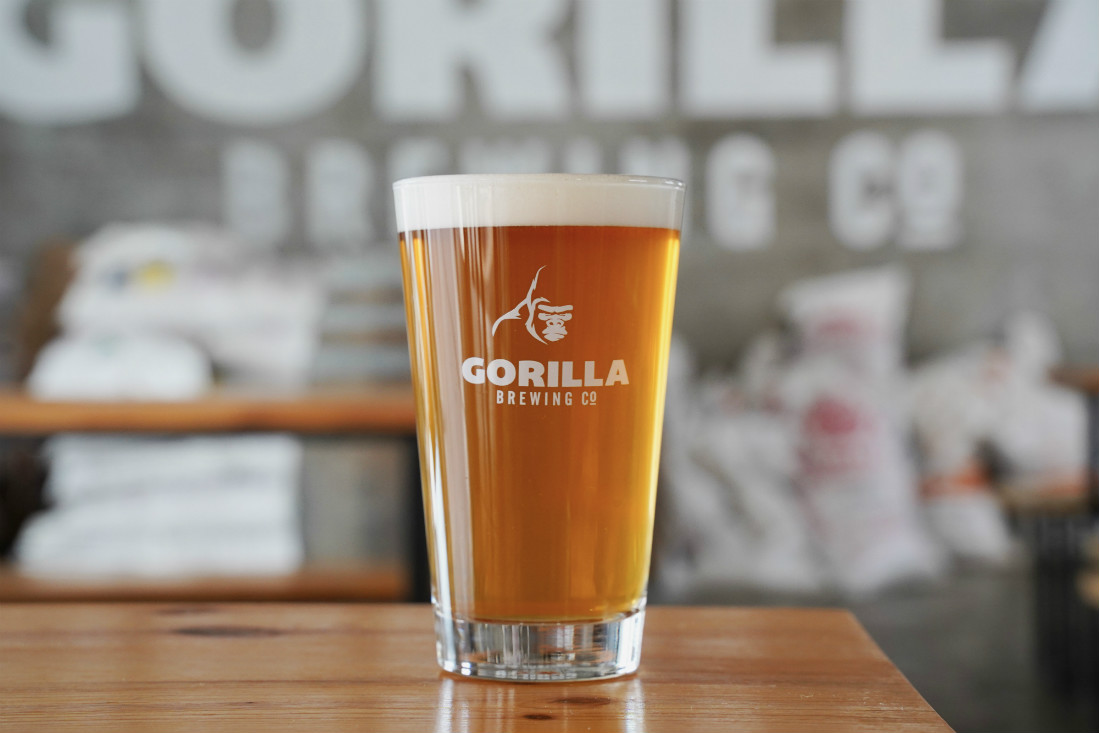
I think Korean craft brewers really go after drinkability, and that they’re at that stage where they don’t have to be very experimental. I think that appeals to a lot more people. At the same time I do think some breweries are experimenting more with a lot of Korean ingredients that you don’t see elsewhere.
It’ll be interesting to see where it goes in a few years. Now that they have a base audience they can start exploding in terms of variety, so it’s a good time to get in because you know where it’s at and you can see it develop.
BT: How do you see Juju Brews fitting into Singapore?
Yu Yan: Obviously right now I’m a retailer, but my end goal isn’t to be one. I will own a retail shop, but my goal is just to bring in Korean craft beer. That’s really it. Hopefully next year, after everything dies down, we’ll have a South Korean craft beer festival, hosting multiple breweries whether they’re with Juju Brews or not, and I think that could be a good expression of bringing in the drinking culture from Korea.
I think a big thing that Korean drinking culture has relative to other beer cultures is that in Korea you have to drink with food. All beer is made to have with food. You watch Korean shows and they’re always snacking and drinking at night, and that’s a real thing.
When I go to Korea I’ll have dinner with my girlfriend and her parents, then have a few casual beers with snacks. It’s nice, kind of a family bonding moment with beer. I’d like to bring that to Singapore—it’s not a thing where you have to drink a lot. It’s okay to have beer at home; it’s expensive to go out, you pay triple the price. Stay at home and have a good beer. That’s a good concept I’d like to import.
BT: Are you planning widespread distribution?
Yu Yan: A few places will start to have [the beers], but this shipment is generally just here to introduce the concept, and I think with the next one, in a few months, I’ll focus mostly on distribution. Right now I want to see how people react, and see that they think it’s actually good. The worst thing is that people may think that Korean craft beer is bad.
BT: Why would people feel negatively about South Korean craft beer?
Yu Yan: They don’t seem to look for it. I think there’s a certain stigma for American craft beer, in general, where people think it must be good, which isn’t true. American craft beer is catered to American taste buds, so you may not like it, and plus there are a lot of bad breweries in America. Korean craft beer has no name for itself, but people here generally like Korean stuff, so we’ll see if that resonates in craft beer. Craft beer drinkers may not think this way, but I don’t know.
BT: How would you compare the craft scenes in South Korea with Singapore?
Yu Yan: As a consumer, and even now after I’ve started this, the way I’ve always seen Singapore is that it’s a very distributor-dictated market. You have these distributor-owned retailers with beers that you can’t find elsewhere. Bottle shops are not very big in Singapore, which is a sad thing.
I love Temple Cellars and go there a lot because I love the variety, but there isn’t really a bottle shop culture here. There’s no outlet for distribution to retail; a lot of distributors have to be retailers. In South Korea you’ll find a lot more variety in the bottle shops and the guest taps are a lot more interesting.
Singapore is a weird market because you go from one bar to another and realize that everyone is carrying the same thing. There’s maybe one or two different things, but they’re just rotating. The only taproom that I would say has really interesting stuff is Burger Bar because they bring in their own beer. They’re the only ones doing it, and all their stuff is only at Burger Bar.
I like that place, and [their selection] makes me want to go there and it’s probably a good business decision… but as a consumer it makes me sad because I want to find more stuff. I understand why it’s like that, but yeah, the lack of variety kind of sucks.
###
Juju Brews offers free same-day delivery on $99+ orders placed by 2pm; shipping is otherwise $15.


